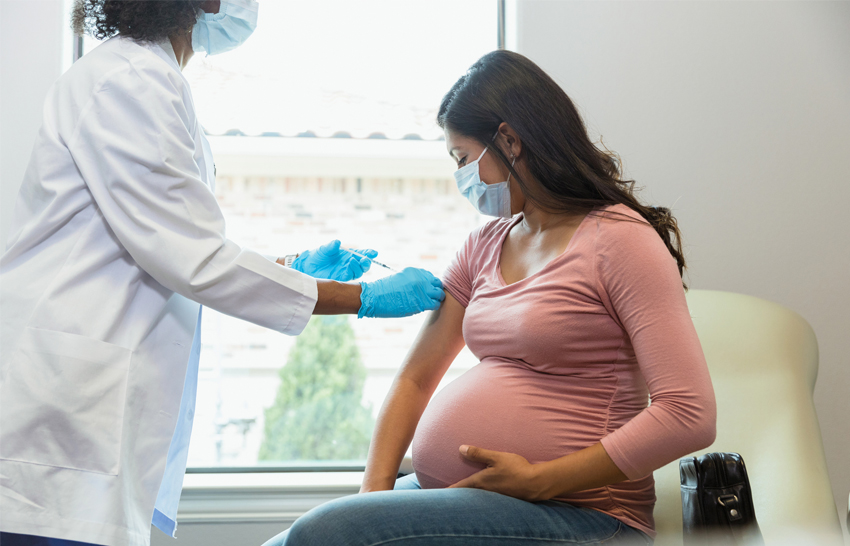

We are approaching the holiday season, planning parties and family gatherings, honoring traditions, and making our favorite dishes. Getting ready for guests, we clean our homes with extra care, decorate to set the theme, get out the recipe for Grandma’s sweet potato pie, gingerbread or tamales, and dress in our finest.
But all may not be merry and bright because we may share more than we intend to as we are also entering the flu season. Some of our friends and loved ones are particularly susceptible to flu and other communicable diseases, including COVID 19, RSV, pneumonia, whooping cough, and measles, to name a few.
Of those who are susceptible, pregnant women especially need protection. We can protect these women and their babies by getting immunized ourselves and by ensuring that they have access to immunizations, too. Vaccines protect pregnant women and newborn babies from severe infections and the morbidity and mortality that arise from those infections.1 The Maternal Vaccination Act (H.R.3348)2 is a bill that was introduced to the House of Representatives in 2023. It stipulates that the Centers for Disease Control and Prevention include a focus on pregnant and postpartum women in their vaccination public awareness campaign, which is to be continued until 2028. The bill also allows grant-funded preventive health services to increase vaccination rates among pregnant and postpartum women and their children.
However, some women are hesitant to be vaccinated while pregnant. Getting up to date on vaccinations before getting pregnant is ideal and is recommended by the American College of Obstetrics and Gynecologists, as well as the World Health Organization.3 However, healthcare professionals should also encourage pregnant women to be vaccinated by providing education about their safety and effectiveness.1
Evidence shows that vaccinations improve maternal health, yet maternal vaccination rates are low, particularly for flu, Tdap, and COVID-19 boosters.1,3 Pregnant women with certain chronic conditions, such as sickle cell disease, type 2 diabetes, and heart disease, are at even higher risk for severe infections that could be prevented with vaccinations.4 Since severe infections during pregnancy or in postpartum women threaten both maternal and infant health, it is doubly important to ensure protection against these vaccine-preventable illnesses.1
So as we gear up for the festivities of this holiday season, let’s all do our part and get our own immunizations up to date and encourage others to do so as well. When most people in the community are vaccinated, herd immunity can help prevent outbreaks and seasonal surges of infection, keeping our holidays happy and healthy.5
Co Author Bios

Lisa R. Roberts, DrPH, MSN, FNP-BC, CHES, FAANP, FAAN
Dr. Roberts is a Professor and the Research Director at the School of Nursing, with a secondary appointment in the Division of Interdisciplinary Studies in the School of Behavioral Health. Her primary research interest concerns maternal health. Her research interests also include mixed methods and community-based self-help interventions, addressing issues impacting health disparities and vulnerable populations. Her clinical focus as a Family Nurse Practitioner is prevention and primary care.

Carlene O. Fider, PhD
Dr. Fider is an early-career social and behavioral scientist with extensive experience in coordinating multidisciplinary efforts. She is also Assistant Clinical Professor in the School of Interdisciplinary Studies. Her research consistently supports the advancement of minoritized voices and highlights ways to reduce disparities that impact those who are underserved, underrepresented and under resourced.
GRANT SUPPORT: Health Resources and Services Administration (HRSA) of the U.S. Department of Health and Human Services (HHS) under grant number UR6MC50347‐01‐00 Maternal Health Research Network (MH‐RN) for MSIs‐‐Research Awards to LOMA LINDA UNIVERSITY, Loma Linda, California.
References:
- Kurasawa, K. (2023). Maternal vaccination—current status, challenges, and opportunities. Journal of Obstetrics and Gynaecology Research, 49(2), 493-509.
- H.R. 3348- Maternal Vaccination Act. https://www.congress.gov/bill/118th-congress/house-bill/3348
- Kahn, K. E., Garacci, E., Razzaghi, H., Jatlaoui, T. C., Skoff, T. H., Ellington, S. R., & Black, C. L. (2024). Flu, Tdap, and COVID-19 vaccination coverage among pregnant women – United States, April 2024. CDC FluVaxView https://www.cdc.gov/fluvaxview/coverage-by-season/pregnant-april-2024.html
- Wang, S., Rexrode, K. M., Florio, A. A., Rich-Edwards, J. W., & Chavarro, J. E. (2023). Maternal mortality in the United States: trends and opportunities for prevention. Annual review of medicine, 74(1), 199-216.
- Gül, A., Alak, S. E., Gül, C., Karakavuk, T., Can, H., Karakavuk, M., Köseoğlu, A. E., Döşkaya, M., Hameş, E. E., & Ün, C. (2023). The importance of vaccines in a sustainable healthy society. In A sustainable green future: Perspectives on energy, economy, industry, cities and environment (pp. 183-212). Springer.
